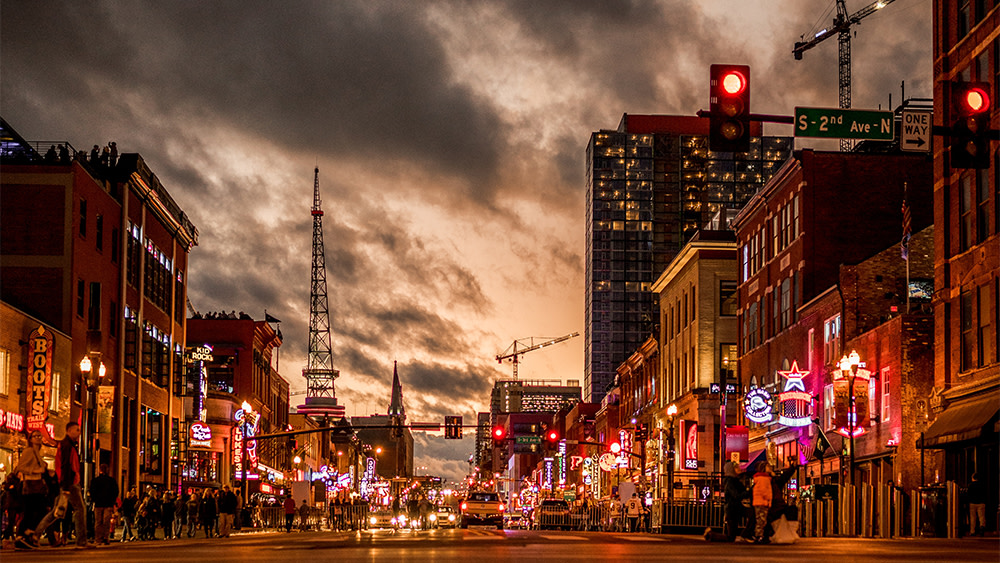Affectionately called “Music City,” Nashville is known for marching to the beat of its own drum — and is becoming a more welcoming place for those who do the same. Approximately 12% of the population are immigrants, with nearly half relocating to the city since 2000, according to Mayor’s Office of New Americans. Tennessee’s capital city also boasts 10 sister cities around the world, including Chengdu, China; Kamakura, Japan; and Erbil, Iraq, among others, with the goal of connecting city residents to “people of the world, promoting peace through mutual respect, understanding and cooperation — one person, one community at a time.” As the region continues to diversify, international students can find a piece of home in this foreign city thanks to its range of ethnic cuisine, shops, and cultures.
International Neighborhoods & Enclaves
In 2012, Nashville had the fastest-growing immigrant population of any US city (Mayor’s Office of New Americans). Two international neighborhoods, Germantown and Little Kurdistan, were well established, while other cultural enclaves are still emerging.
Today, international students can find ethnic restaurants, shops, groceries, and organizations that are certain to provide a sense of community (and hopefully cure a case of homesickness).
Nolensville Pike, “International Corridor”
The area south of downtown has become the city’s unofficial international corridor and is a great place to grab a global bite. Nolensville Road is lined with ethnic food trucks, bakeries, restaurants, and markets showcasing flavors from around the world, including Turkey, India, Ethiopia, Cuba, Mexico, the Mediterranean, and more. Everything from baklava to curry can be found within the two-mile span. It is worth a visit simply to get a taste of home or to try foods from different cultures.
International students will want to stop by Sun’s K&S World Market. Founded in 1995 by an Asian immigrant couple, this grocery store now sells products from around the globe, including Asia, Europe, Africa, and Latin America.
International Restaurants along Nolensville Pike
Surati Indian Street Food — This counter-service eatery is a go-to spot for West Indian street food, such as sev khamani, rava masala dosa, or pav bhaji.
Bangkokville Thai Restaurant — A favorite place for cuisine from Central Thailand, like duck panang, seafood clay pot, and kai Bangkok.
La Conchita — Visit this neighborhood panaderia for homemade Mexican bread, cookies, and cakes.
Frida’s Oaxacan Cuisine — This family-owned restaurant serves regional specialties like chapulines (fried grasshoppers), memelas, quesillo, tlayudas, and moles.
Midori — The popular eatery has been serving Korean and Japanese specialties, including sushi, since 2001.
Sulav International Market & Restaurant — Enjoy freshly grilled shawarma and kabobs before shopping for Turkish specialty items and ingredients.
Little Kurdistan
Located off Elysian Fields Court, the area known as Little Kurdistan is home to a community of more than 15,000 Kurds. The neighborhood’s Kurdish identity goes back to the 1970s when many Kurds left their homes throughout southeastern Turkey, northern Iraq, northern Syria, and northwestern Iran to study in the area, as well as to escape hardships and war. Others have followed for similar reasons since that time and a thriving community has emerged.
International Muslim students can find community and religious support at the Salahadeen Center, one of the largest Muslim community centers in the city.
Kurdish Restaurants
Edessa Restaurant — This eatery serves traditional Kurdish and Turkish specialties, including a range of kabobs.
House of Kabob — Find kubideh, chicken sultani, and kabobs at one of the region’s oldest Persian restaurants.
Jerusalem Reebar — Palestinian dishes are prepared with fresh ingredients, including shawarma, shish tawook, and eggplant fatoosh.
Kurdish Markets
Azadi International Food Market — Find fresh pita, Lebanese flatbread, naan, and other baked goods alongside an array of condiments and other Turkish ingredients.
Newroz Market — This Middle Eastern market sells imported ingredients and fresh halal meat, as well as grilled shawarma sandwiches.
Where to Find Latinx Culture
With a growing Hispanic and Latin population, the city features many authentic restaurants, businesses, shops, and grocers. The Antioch neighborhood, just 12 miles southeast of the city center, is on the rise as a cultural enclave and is worth a visit for Latin flavors.
The Plaza Mariachi Cultural Experience in Nolensville Pike is a favorite among locals and students alike for its flavorful food (think arepas, ceviche, carne asada, etc.), live entertainment (including mariachi), and ethnic shops. Decorated in the style of a marketplace in Old Mexico, the space “exists to celebrate cultural diversity.”
International students may want to visit Conexion Americas, as it is working to establish “a welcoming community and create opportunities where Latino families can belong, contribute, and succeed.”
Latinx Restaurants
Antigua Cocina Guatemalteca — Traditional Guatemalan cuisine is served here, including chuchitos, pepián, and chile rellenos.
Casa Fiesta — This restaurant has been serving Mexican specialties for 30 years.
Alebrije — Try dishes inspired by the street food of Mexico, including sope, elote, tostada, and tacos.
Mofongo Cafe — Find a variety of Dominican, Puerto Rican, and Cuban dishes in this Berry Hill eatery.
Latinx Markets
Mazfresco Market — This Nolensville Pike grocery store sells a variety of Latin products from Puerto Rico, Honduras, Mexico, El Salvador, Colombia, Argentina, Venezuela, Guatemala, Cuba, and Peru.
El Pueblito Super Mercado — Shop for imported Mexican ingredients and produce here.
Where to Find Asian Culture
The city might not have an established Asian neighborhood, but international students can find a taste of home at eateries, markets, and shops throughout the city. The neighborhoods of White Bridge and Antioch feature a variety of Korean, Vietnamese, Indian, and Thai restaurants. Major cultural festivals and events take place throughout the year, and are also a way to find familiar scents, tastes, and sounds of home.
Asian Restaurants
International Market & Restaurant — This Thai restaurant has been serving traditional dishes to Belmont University students since 1975.
Hai Woon Dai — This unassuming eatery serves authentic Korean food and even sells house-made kimchi to go.
Steam Boys — A favorite for xiao long bao, the casual spot also serves dumplings, noodle soups, and boba tea for takeaway.
China Spring — This Cantonese-style eatery is affordable and features familiar dishes.
Dumpling House — As the name suggests, this is the go-to place for dumplings.
Hai’s Sushi & Pho — This family-run eatery serves Japanese and Vietnamese dishes.
Asian Markets
King Market — Visit this family-owned grocery store to shop (and eat at the Lao Thai Café located inside).
InterAsian Market & Deli — Find a wide variety of products from Southeast Asia here.
Tennessee Oriental Market — Shop at the city’s oldest Korean grocery store.
International Events
As the area continues to diversify, more cultural events will be scheduled throughout the year. Here are a few that happen annually:
Hispanic Heritage Festival
Chinese New Year
International Community Centers
Though international students can get the flavors of home at restaurants and markets throughout the city, these cultural centers may provide a greater sense of community through events, programs, and social activities.
Feel at Home Without Leaving Campus
Belmont University
Located just two miles from the city center, Belmont University provides a welcoming atmosphere for international students to thrive by upholding its mission to “empower men and women of diverse backgrounds to engage and transform the world with disciplined intelligence, courage, and faith.” The campus’ close proximity to the famous Music Row is a plus for those students wanting to study music business.
The college offers several resources to help international students succeed on campus and beyond. More than 180 student organizations provide students the opportunity to find a community of peers, including the Chinese Cultural Association, Asian American Association, Hispanic Student Association, Muslim Student Association, and Japanese Culture Club, among many others.
The university’s International Students and Scholars Services offers an Intercultural Competency Program to help students “develop the skills needed to interact effectively with people different than themselves.” Students will also find help with administration, orientation, and other programs through the services.
Finding a Home Away from Home
Different cultures may still be establishing strong communities in Nashville, but the city’s diverse offering of ethnic eateries ensures that international students can find a taste of home while attending Belmont University.
Shorelight can help you find your US university home away from home >

